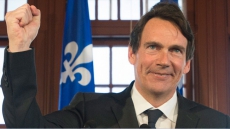OTTAWA - Almost a year after facing a barrage of bad publicity, National Defence is having another look at a policy that ended the careers of gravely injured soldiers who wanted to remain in uniform.
Defence Minister Rob Nicholson has told a House of Commons committee that a working group was set up last summer to study the military's universality of service rule, which has been used as a pretext to release wounded combat veterans, many of them with post-traumatic stress.
At stake is the delicate balance between an individual's desire to serve and the need for troops to be fit enough to deploy for operations both at home and abroad, Nicholson said in a seven-page letter to Commons defence committee.
"This working group is examining how the policy can be best applied to retain individuals who are willing and able to serve, while also ensuring the necessary availability of all Canadian Armed Forces personnel to perform their lawful military service," he said.
"Once this work is complete, the working group will provide recommendations to the chief of military personnel."
The defence committee conducted a study of care for ill and injured soldiers, and recommended last June that the policy be examined in light of complaints from soldiers who were summarily dismissed after pleading to remain.
Nicholson's response to the committee's overall report was quietly tabled in Parliament late last week.
He said the working group carrying out the study will also examine the impact of the policy on the military pension system. Many ex-soldiers told The Canadian Press last year that they were being released before they qualified for an unrestricted pension.
At the time, Nicholson told the Commons that no one was being forced out and that the department worked with every individual to prepare them for the transition to civilian life.
But he was contradicted by troops, who said despite the minister's assurances, they had been shown the door on a medical release even though they had begged to retrain for other jobs within the military.
Some were let go just shy of hitting the 10-year mark, when they would qualify for a fully-indexed pension. Prior to that, soldiers are only eligible for a return of their contributions.
Many said the medical release, especially with a PTSD designation, limited their career prospects in the civilian world.
Retired corporal David Hawkins, one of the soldiers who took on the government last year, said he was pleased to hear about the review, but wondered what took so long.
Hawkins said the policy needn't be completely overhauled. Instead, it should be made flexible enough to accommodate individuals, the way the military did following both world wars when the wounded, including amputees, were allowed to keep serving.
"There's always work and they don't have to go overseas," Hawkins said.
"We don't send 100 per cent of our people overseas at the same time. There's always people back home who have to do the administrative (work). When they say (the wounded) would be useless, that's untrue."
The threat of being kicked out is preventing some of his friends with post-traumatic stress from coming forward to seek treatment, he added.
That backs up observations from former military ombudsman Pierre Daigle, who warned that the inflexibility of the policy may actually be causing harm.
Given the exceptions made following previous, much larger wars, it's difficult to fathom why the policy is so strict and unforgiving, said NDP defence critic Jack Harris.
"There's a rigidity there that just seems unnecessary and they can't accept the fact that not everybody is necessary to be put into battle," he said.
Harris said he's skeptical the working group will actually recommend changes.




